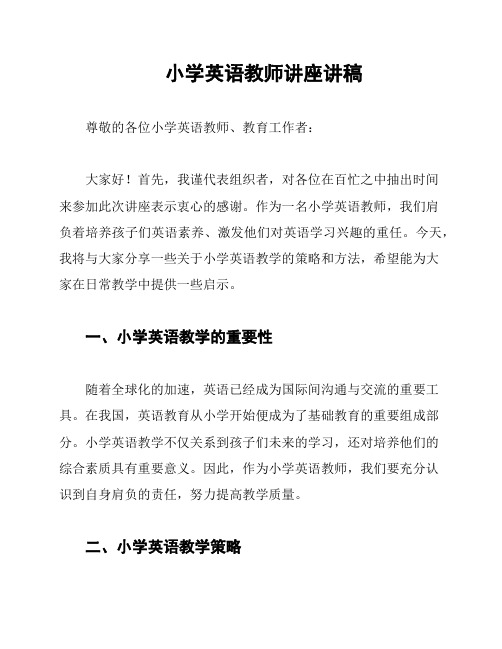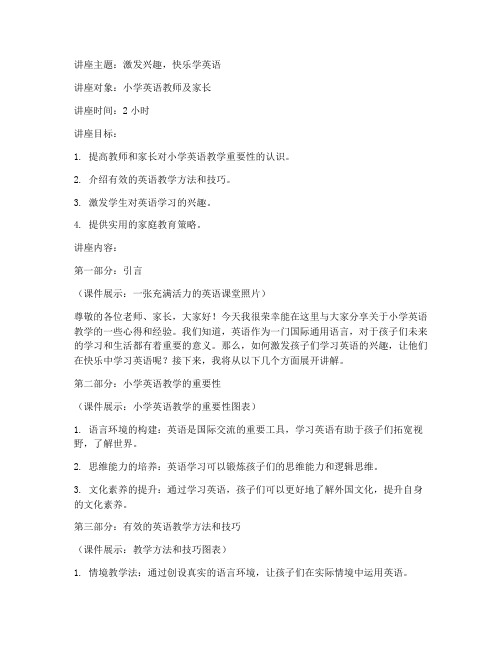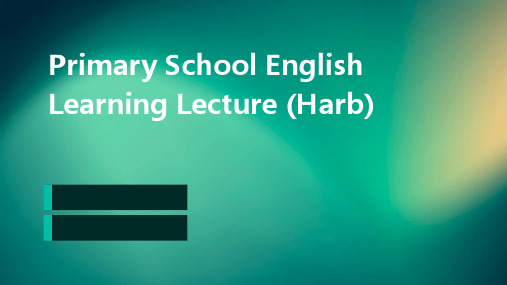小学英语培训讲座稿
小学英语培训班的发言稿(3篇)

第1篇大家好!我是XX小学英语培训班的负责人,非常荣幸能够在这里与大家分享我们培训班的一些情况,以及我们对英语学习的看法和理念。
首先,我想对各位家长表示衷心的感谢。
正是因为你们的信任和支持,我们的英语培训班才能够不断发展壮大。
同时,也感谢各位同学们的积极参与,是你们的努力和进步,让我们有了不断前行的动力。
一、英语学习的重要性随着我国经济的快速发展和国际地位的不断提高,英语已经成为了一种重要的国际交流工具。
学习英语不仅可以帮助我们更好地了解世界,还可以为我们的未来发展提供更多机会。
以下是英语学习的一些重要性:1. 增强国际视野:英语是世界上最广泛使用的语言之一,学习英语可以让我们更好地了解世界各地的文化、历史和科技发展。
2. 提升综合素质:英语学习可以锻炼我们的思维、表达和沟通能力,有助于培养我们的综合素质。
3. 增加就业机会:随着英语在国际交流中的地位日益重要,具备英语能力的人才在求职市场上更具竞争力。
4. 培养跨文化交际能力:英语学习有助于我们更好地与不同文化背景的人进行交流,提高我们的跨文化交际能力。
二、我们的英语培训班为了帮助同学们更好地学习英语,我们特开设了XX小学英语培训班。
以下是我们的培训班特点:1. 专业的师资团队:我们拥有一支经验丰富、教学水平高的英语教师队伍,为同学们提供优质的教学服务。
2. 互动式教学模式:我们采用互动式教学模式,让同学们在轻松愉快的氛围中学习英语,提高学习兴趣。
3. 系统化的课程设置:我们的课程设置科学合理,从基础知识到实际应用,帮助同学们逐步提高英语水平。
4. 个性化辅导:针对同学们的个体差异,我们提供个性化辅导,确保每位同学都能得到充分的关注和指导。
5. 营造良好的学习氛围:我们致力于为同学们营造一个良好的学习氛围,让他们在愉快的氛围中学习英语。
三、如何学好英语1. 培养学习兴趣:兴趣是最好的老师,我们要努力培养同学们对英语学习的兴趣,让他们在学习中找到乐趣。
小学英语教师讲座讲稿

小学英语教师讲座讲稿尊敬的各位小学英语教师、教育工作者:大家好!首先,我谨代表组织者,对各位在百忙之中抽出时间来参加此次讲座表示衷心的感谢。
作为一名小学英语教师,我们肩负着培养孩子们英语素养、激发他们对英语学习兴趣的重任。
今天,我将与大家分享一些关于小学英语教学的策略和方法,希望能为大家在日常教学中提供一些启示。
一、小学英语教学的重要性随着全球化的加速,英语已经成为国际间沟通与交流的重要工具。
在我国,英语教育从小学开始便成为了基础教育的重要组成部分。
小学英语教学不仅关系到孩子们未来的学习,还对培养他们的综合素质具有重要意义。
因此,作为小学英语教师,我们要充分认识到自身肩负的责任,努力提高教学质量。
二、小学英语教学策略1. 激发学习兴趣兴趣是最好的老师。
我们要善于运用各种教学手段,如图片、实物、游戏等,让英语学习变得生动有趣,从而激发学生们的学习兴趣。
2. 注重语音教学语音是英语学习的基础,我们要重视语音教学,让学生掌握正确的发音方法,为今后的英语学习打下坚实基础。
3. 情景教学创设真实的语境,让学生在情景中自然地学习和使用英语。
例如,通过角色扮演、故事讲解等方式,让学生在实际情境中锻炼英语表达能力。
4. 差异化教学考虑到学生之间的个体差异,我们要因材施教,针对不同程度的学生制定合适的教学计划,使每个学生都能在原有基础上得到提高。
5. 鼓励合作学习鼓励学生之间进行合作学习,通过讨论、互动等形式,提高他们的团队协作能力和沟通能力。
三、教师素养提升作为一名优秀的小学英语教师,我们不仅要具备扎实的英语专业知识,还要不断提高自己的教育教学能力。
具体措施包括:1. 深入学习英语教学理论,掌握教育教学方法。
2. 参加各类教育培训,提高自己的业务水平。
3. 关注教育领域的发展动态,不断更新教育观念。
最后,希望大家能够将本次讲座的内容运用到日常教学中,努力提高小学英语教学质量,为培养具有国际竞争力的优秀人才贡献力量。
小学英语讲座交流发言稿

大家好!今天,我很荣幸能在这里与大家分享一些关于小学英语学习的心得体会。
英语作为一门国际通用语言,在我们的生活中扮演着越来越重要的角色。
今天,我想从以下几个方面来和大家交流一下小学英语学习的经验。
一、激发学习兴趣兴趣是最好的老师。
在学习英语的过程中,我们要努力激发自己对英语的兴趣。
以下是一些建议:1. 创设良好的学习氛围。
在家中,可以播放英语歌曲、观看英语动画片,让英语成为生活的一部分。
2. 参加英语角、英语俱乐部等活动,与同学们一起练习英语,提高口语表达能力。
3. 阅读英语绘本、故事书,提高阅读兴趣,拓宽词汇量。
二、培养良好的学习习惯1. 制定学习计划。
每天安排一定的时间学习英语,如背诵单词、阅读英语文章等。
2. 坚持练习听力。
可以通过收听英语广播、观看英语电影等方式,提高听力水平。
3. 多进行口语练习。
与同学、老师进行英语对话,提高口语表达能力。
4. 及时复习。
学习新知识后,要及时复习巩固,避免遗忘。
三、掌握学习方法1. 分类记忆单词。
将单词按照词性、词义进行分类,有助于提高记忆效果。
2. 学会语法。
掌握基本的语法知识,有助于提高写作和口语表达能力。
3. 利用网络资源。
通过在线课程、英语学习APP等途径,丰富学习内容,提高学习效果。
4. 重视阅读。
通过阅读英语文章,提高词汇量、阅读速度和理解能力。
四、注重实践1. 参加英语演讲、写作比赛等活动,提高英语实际运用能力。
2. 积极参加英语角、英语俱乐部等,锻炼口语表达能力。
3. 主动与外国朋友交流,提高英语沟通能力。
总结:学习英语是一个长期的过程,需要我们不断努力。
希望大家在小学英语学习的道路上,保持热情,勇于实践,不断提高自己的英语水平。
最后,祝愿大家在英语学习的道路上越走越远,收获满满!谢谢大家!。
小学英语教材培训发言稿(3篇)

第1篇大家好!今天,我非常荣幸能够在这里为大家分享小学英语教材培训的发言。
英语作为一门国际通用语言,在我国教育体系中占据着越来越重要的地位。
为了提高小学英语教学质量,我们今天特别邀请了各位专家和老师共同探讨如何更好地使用小学英语教材,培养学生的英语学习兴趣和实际运用能力。
以下是我对小学英语教材培训的一些思考,希望能为大家带来一些启示。
一、明确教材的地位和作用小学英语教材是教师进行教学的重要依据,也是学生学习英语的基石。
教材的内容丰富,涵盖了语音、词汇、语法、阅读、写作等方面,旨在培养学生的英语综合运用能力。
因此,我们要充分认识教材的地位和作用,将其作为教学的重要资源。
二、深入了解教材的特点1. 基础性:小学英语教材注重基础知识的学习,为学生的英语学习奠定基础。
2. 实用性:教材内容贴近学生的生活实际,有助于提高学生的英语实际运用能力。
3. 互动性:教材设计了丰富的活动,鼓励学生参与互动,提高学习兴趣。
4. 层次性:教材内容循序渐进,满足不同层次学生的学习需求。
三、合理运用教材1. 突出重点,把握难点在教学中,我们要根据教材内容,确定教学重点和难点,有针对性地进行教学。
对于重点内容,要引导学生深入理解,熟练掌握;对于难点内容,要耐心讲解,帮助学生突破。
2. 创设情境,激发兴趣教师要根据教材内容,创设生动、有趣的情境,激发学生的学习兴趣。
可以通过图片、视频、游戏等多种形式,让学生在轻松愉快的氛围中学习英语。
3. 重视实践,提高能力英语是一门实践性很强的学科,我们要注重培养学生的实际运用能力。
在教学中,可以组织学生进行角色扮演、小组讨论、口语表达等活动,让学生在实际操作中提高英语水平。
4. 注重个体差异,因材施教每个学生的学习能力和兴趣爱好都不同,我们要关注学生的个体差异,因材施教。
对于学习困难的学生,要给予更多的关心和帮助;对于学习优秀的学生,要鼓励他们不断进步,挑战自我。
四、加强教师培训,提高教学质量1. 提高教师自身素质教师是教学的关键,我们要加强教师培训,提高教师的英语素养和教学能力。
小学英语讲座稿和课件

讲座主题:激发兴趣,快乐学英语讲座对象:小学英语教师及家长讲座时间:2小时讲座目标:1. 提高教师和家长对小学英语教学重要性的认识。
2. 介绍有效的英语教学方法和技巧。
3. 激发学生对英语学习的兴趣。
4. 提供实用的家庭教育策略。
讲座内容:第一部分:引言(课件展示:一张充满活力的英语课堂照片)尊敬的各位老师、家长,大家好!今天我很荣幸能在这里与大家分享关于小学英语教学的一些心得和经验。
我们知道,英语作为一门国际通用语言,对于孩子们未来的学习和生活都有着重要的意义。
那么,如何激发孩子们学习英语的兴趣,让他们在快乐中学习英语呢?接下来,我将从以下几个方面展开讲解。
第二部分:小学英语教学的重要性(课件展示:小学英语教学的重要性图表)1. 语言环境的构建:英语是国际交流的重要工具,学习英语有助于孩子们拓宽视野,了解世界。
2. 思维能力的培养:英语学习可以锻炼孩子们的思维能力和逻辑思维。
3. 文化素养的提升:通过学习英语,孩子们可以更好地了解外国文化,提升自身的文化素养。
第三部分:有效的英语教学方法和技巧(课件展示:教学方法和技巧图表)1. 情境教学法:通过创设真实的语言环境,让孩子们在实际情境中运用英语。
2. 游戏教学法:利用游戏激发学生的学习兴趣,提高课堂氛围。
3. 互动式教学:鼓励学生积极参与课堂活动,提高他们的口语表达能力。
4. 多媒体教学:运用多媒体技术,丰富教学内容,提高教学效果。
第四部分:激发学生英语学习兴趣的策略(课件展示:激发学习兴趣的策略图表)1. 故事教学:通过讲述有趣的英语故事,激发学生的学习兴趣。
2. 歌曲教学:利用英语歌曲,让孩子们在轻松愉快的氛围中学习英语。
3. 角色扮演:通过角色扮演,让孩子们在模仿中学习英语。
4. 英语角:组织英语角活动,让孩子们有机会与外教或其他学生交流。
第五部分:家庭教育策略(课件展示:家庭教育策略图表)1. 营造良好的家庭氛围:鼓励家长和孩子一起学习英语,共同进步。
小学英语专家讲座稿范文

小学英语专家讲座稿范文Learning English at the elementary level is a critical foundation for future academic and professional success. As an experienced English language educator, I am honored to share my insights and strategies for effectively teaching English to young students. In this lecture, I will discuss key principles and best practices that can help elementary school teachers foster strong English language skills in their pupils.One of the most important factors in elementary English education is creating a supportive and engaging learning environment. Young students need to feel comfortable taking risks and making mistakes as they develop their language abilities. Teachers should strive to cultivate a classroom atmosphere that is warm, encouraging, and free of excessive pressure or criticism. Providing plenty of opportunities for students to practice speaking, listening, reading, and writing in low-stakes, collaborative activities can go a long way in building their confidence and fluency.Another crucial element is ensuring lessons are age-appropriate andtailored to students' proficiency levels. Elementary school children have very different cognitive, social, and emotional needs compared to older students. Curriculum and instructional methods must be carefully designed to capture their short attention spans, capitalize on their natural curiosity, and scaffold learning in a step-by-step manner. For instance, relying heavily on visual aids, hands-on manipulatives, songs, and games can make language instruction more accessible and enjoyable for young learners.In addition, effective elementary English teaching requires a balanced, integrated approach that develops all four core language skills concurrently. It is not enough to solely focus on rote vocabulary memorization or grammar drills. Students need ample practice applying their knowledge in authentic, communicative contexts. Lessons should seamlessly incorporate listening, speaking, reading, and writing activities that reinforce and build upon one another. This holistic methodology helps students make meaningful connections and achieve well-rounded proficiency.Furthermore, elementary English teachers must be adept at fostering active student engagement. Passive, lecture-based instruction is generally ineffective for this age group. Instead, lessons should be interactive, dynamic, and centered around student participation. Strategies such as pair work, small group discussions, total physical response techniques, and project-based learning can encouragestudents to actively use the language. When students are actively involved in the learning process, they are more likely to stay motivated and make tangible progress.Equally important is the judicious use of the students' native language, when appropriate. While the target language should be the primary medium of instruction, judiciously incorporating the students' first language can serve as a valuable scaffold. This can involve providing translations, clarifying complex concepts, or checking for comprehension. Used strategically, the students' native language can help minimize frustration and facilitate smoother transitions as they acquire English.Finally, effective assessment and feedback are critical components of quality elementary English instruction. Teachers must employ a balanced approach that includes both formative and summative assessments. Formative assessments, such as informal observations, exit tickets, and learning journals, allow teachers to continuously monitor student progress and adjust lessons accordingly. Summative assessments, like unit tests and performance-based tasks, provide valuable data on students' overall language proficiency. Providing students with clear, constructive feedback on their strengths and areas for improvement is also essential for promoting learning and growth.In conclusion, teaching English effectively at the elementary level requires a multifaceted approach that addresses the unique needs and characteristics of young learners. By creating a supportive learning environment, delivering age-appropriate and skills-integrated lessons, fostering active engagement, judiciously using the students' native language, and implementing well-rounded assessment practices, elementary school teachers can lay a strong foundation for their students' lifelong English language development. Through the implementation of these research-based strategies, we can empower our youngest learners to become confident, competent users of the English language.。
小学英语老师培训发言稿(3篇)

第1篇大家好!我是本次小学英语老师培训班的发言人。
首先,我要感谢学校为我们提供这次宝贵的学习机会,让我有机会与大家共同探讨小学英语教学的方法和技巧。
在此,我将结合自己的教学经验,对小学英语教学进行一些分享和交流。
一、小学英语教学的重要性1. 培养学生的语言素养英语作为一门国际通用语言,对培养学生的语言素养具有重要意义。
通过学习英语,学生可以拓宽视野,了解世界各地的文化,提高自身的综合素质。
2. 培养学生的思维品质英语学习不仅是一种语言技能的培养,更是一种思维方式的训练。
在英语学习过程中,学生可以锻炼自己的逻辑思维、创新思维和批判性思维。
3. 促进学生的全面发展英语教学有助于培养学生的兴趣爱好,提高学生的审美情趣,促进学生全面发展。
二、小学英语教学的基本原则1. 以学生为中心在教学过程中,我们要关注学生的个体差异,尊重学生的兴趣和需求,充分发挥学生的主体作用。
2. 注重语言实践英语是一门实践性很强的学科,我们要注重培养学生的听说读写能力,提高学生的英语实际运用能力。
3. 培养学生的自主学习能力我们要引导学生学会学习,培养学生的自主学习能力,让他们在英语学习过程中不断提高自己。
4. 重视情感态度价值观的培养在英语教学中,我们要关注学生的情感态度价值观,培养学生的国际视野和跨文化交际能力。
三、小学英语教学的方法与技巧1. 创设情境,激发兴趣情境教学法是小学英语教学的重要方法之一。
我们要根据教学内容,创设生动有趣的教学情境,激发学生的学习兴趣。
2. 多媒体辅助教学多媒体技术可以帮助我们更好地展示教学内容,提高教学效果。
在英语教学中,我们可以运用多媒体课件、视频、音频等多种形式,丰富教学内容。
3. 小组合作学习小组合作学习可以培养学生的团队协作精神,提高学生的英语交际能力。
在课堂上,我们可以将学生分成若干小组,让他们在小组内进行讨论、交流,共同完成学习任务。
4. 任务型教学任务型教学是小学英语教学的重要方法之一。
小学英语学习讲座(HArb)

With the globalization of the economy and society, English has become an essential skill for individuals to adapt to the modern world. Therefore, primary school English learning has gained increasing attention and importance in China.
The cultivation of four skills: listening, speaking, reading, and writing
Reading
Introduce a variety of reading materials, including graded readers, simple novels, and news articles.
03
practice writing in different contexts, including personal
letters and reviews.
Guidance on learning strategies and methods
1
Help students develop good learning habits, such as previewing and summarizing.
The significance of primary school English learning
Cultivating language skills
Primary school is the critical period for language acquisition. English learning at this stage can help students develop basic language skills, including listening, speaking, reading, and writing.
- 1、下载文档前请自行甄别文档内容的完整性,平台不提供额外的编辑、内容补充、找答案等附加服务。
- 2、"仅部分预览"的文档,不可在线预览部分如存在完整性等问题,可反馈申请退款(可完整预览的文档不适用该条件!)。
- 3、如文档侵犯您的权益,请联系客服反馈,我们会尽快为您处理(人工客服工作时间:9:00-18:30)。
小学英语培训讲座稿关于低段英语教学的思考各位领导,各位同仁,我是来自___的___。
感谢中心校组织这次低调而实在的活动,让我们有机会一起研究和探讨。
今天,我们有幸聆听了***老师的精彩课堂和___的分享,为我们的英语教学带来了新的元素。
作为英语老师,我们不断研究和培训,不断成长。
我也不例外,通过各种培训,我收获了很多。
一、听专家的讲座,收获全新的教育理念和思想每次研究,我们总是期待听到有意义的课堂。
名师专家们的课堂魅力是我们无法模仿的,但他们传递的教育理念和思想可以应用到我们的教学中。
我印象最深的是___老师的一节对话课,通过角色扮演将对话简单而真实地呈现出来。
她的5W (who,when。
where。
what。
why)对阅读课的解说让我们觉得阅读教学如此简单。
___老师的个人魅力更是无与伦比,他的英语课就像一个轻松的英语聚会,尤其是歌曲游戏在他的课堂信手拈来。
二、听公开课,感受课堂的魅力,聆听学生最真的声音。
每次公开课都能感受到阳光热情的教师的专业素养,目睹精彩的课堂生成。
就像今天的课堂一样。
三、教学竞技,找到差距,提升自我无论是校内还是校外的公开课,我们的课一般都会经过多次的试教。
有过这样教学竞赛经历的老师都会感叹进步神速,教学能力得到快速提升。
但怎么去经营一个自己认为最理想的英语课堂呢?每个人都不一样,但有一点是可以肯定的,在课堂上,老师和学生是平等的交流,彼此分享思考的快乐,顿悟的惊喜。
今天我想借中心校给我们组织的这次机会,聊一聊我理想的低段英语课堂。
我想谈一下我在教三年级时的经历。
我一开始觉得这个年级的课程非常简单,几个单词和问候语就能搞定了。
但是,实际情况却让我大吃一惊。
因为学生没有语言环境,简单的词汇和句型也很难学好。
我必须花费很多时间和精力来管理课堂,让学生活跃起来。
但是,即使我做了这些努力,第二节课还是会回到原点。
针对这种情况,我进行了思考和行动。
我们学校一直关注语音教学和高年级的阅读语篇教学,但是低年级的教学却被忽略了。
我认为,低年级的教学应该注重培养学生的兴趣,并且需要花费更多的时间关注有效的听、说、玩、演、唱。
我发现,放慢教学步骤,适时按下教学的暂停键非常重要。
在低年级教学中,课堂语言非常关键。
由于学生的英语基础几乎为零,我们需要使用汉语或英语进行教学。
但是,使用语言并不是唯一的解决方法。
我们可以使用体态语言,例如点头、摇头、挥手、竖大拇指等等,来让学生明白和理解老师的指令。
此外,语调、表情、手势、动作等等也能帮助学生的理解。
我们可以通过这些方式来有效地开展活动,直到孩子明白老师的意思。
Teachers should use simple and clear English in the classroom。
not only for giving ns and controlling classroomdiscipline (e.g。
"123.444.AAA aaa。
ABCD。
EFG;")。
___ such as "Let's。
"。
"look。
listen。
read。
sing。
point" should be usedas much as possible。
Providing students with a large amount of English input can be more effective for teaching and learning.___。
___ and do whatever they want。
such as standing up or walking around。
To address this。
the teacher should move around the classroom like a student。
meeting their needs and paying n to their n。
so that they ___.In large classes。
it is difficult to pay n to every student。
Therefore。
___ students to read and speak in pairs or small groups。
___.In lower grades。
classroom ___ can be a very effective method。
At the beginning of each class。
the teacher can draw a group n on the blackboard。
and at the end of the class。
they can select an "English Star" based on performance。
and give extra points to the group。
Each group should have an observer whorecords ns of the class。
homework。
___ summarize the progressof the class each month.___ materials。
except for。
and video ___ easily distracted。
so teachers can use real objects。
self-made pictures。
word cards。
headwear。
simple drawings。
and ns instead。
For example。
students can use nery and colors they have on hand to learn about them。
and they can draw and act out body ___ of the school year。
students can make and wear their own headwear to get to know the characters.Good habits should be ___.The famous British writer。
Sacheray。
once said。
"Sow a r。
reap a habit。
sow a habit。
reap a character。
sow a character。
reap a destiny." Every subject has its own habits when it comes to learning language ___。
speaking。
reading。
and writing。
English learning ___。
one cannot ___'s ns。
students ___ as required。
Listening to recordings can also make language n ___ students。
___")。
I also ask them to listen three times: first。
listen and point to where they hear the sound。
second。
listen and readalong quietly。
third。
read and follow the tape。
___。
When a student is asked to perform on stage。
I use a "filming" process。
where the teacher is the director。
the student is the actor。
and the other students are the camera crew。
By doing this。
students can___ carefully in class and select a "super ears" ___ and reading skills。
I require students to spend 15 minutes each day practicing and record their progress in a self-made logbook。
I also select a "listening and reading star" every week.___ the problem of low n and n span in younger students。
itis essential to design and ___ I try to turn vocabulary。
sentences。
and other materials into songs。
chants。
and games。
such as "hello (nery)。
good morning to you。
how are you?" Sometimes。
I feel like I'm teaching music。
art。
or even physical n instead of English。
For useful activity ideas。
I mend the following websites:。
and。
I also mend two ___.In n。
by cultivating good listening habits。
students ___.。
